Marshfield Bakery: International Expansion Strategy - BABS University
VerifiedAdded on 2023/06/10
|13
|3717
|164
Report
AI Summary
This report assesses the internationalisation strategy of Marshfield Bakery, a successful UK-based company, focusing on its potential expansion into India. The report provides an overview of the company, justifies the selection of India as a target market based on its population and changing consumer preferences, and applies relevant academic theories such as the Uppsala and Network models for international market selection and entry strategies. Strategies like franchising, outsourcing, exporting, licensing, and joint ventures are discussed. Furthermore, the report identifies potential barriers to international expansion, including language and legal challenges, and suggests implementation approaches for successful entry into the Indian market. This analysis aims to provide a comprehensive understanding of the opportunities and challenges associated with Marshfield Bakery's internationalisation process.
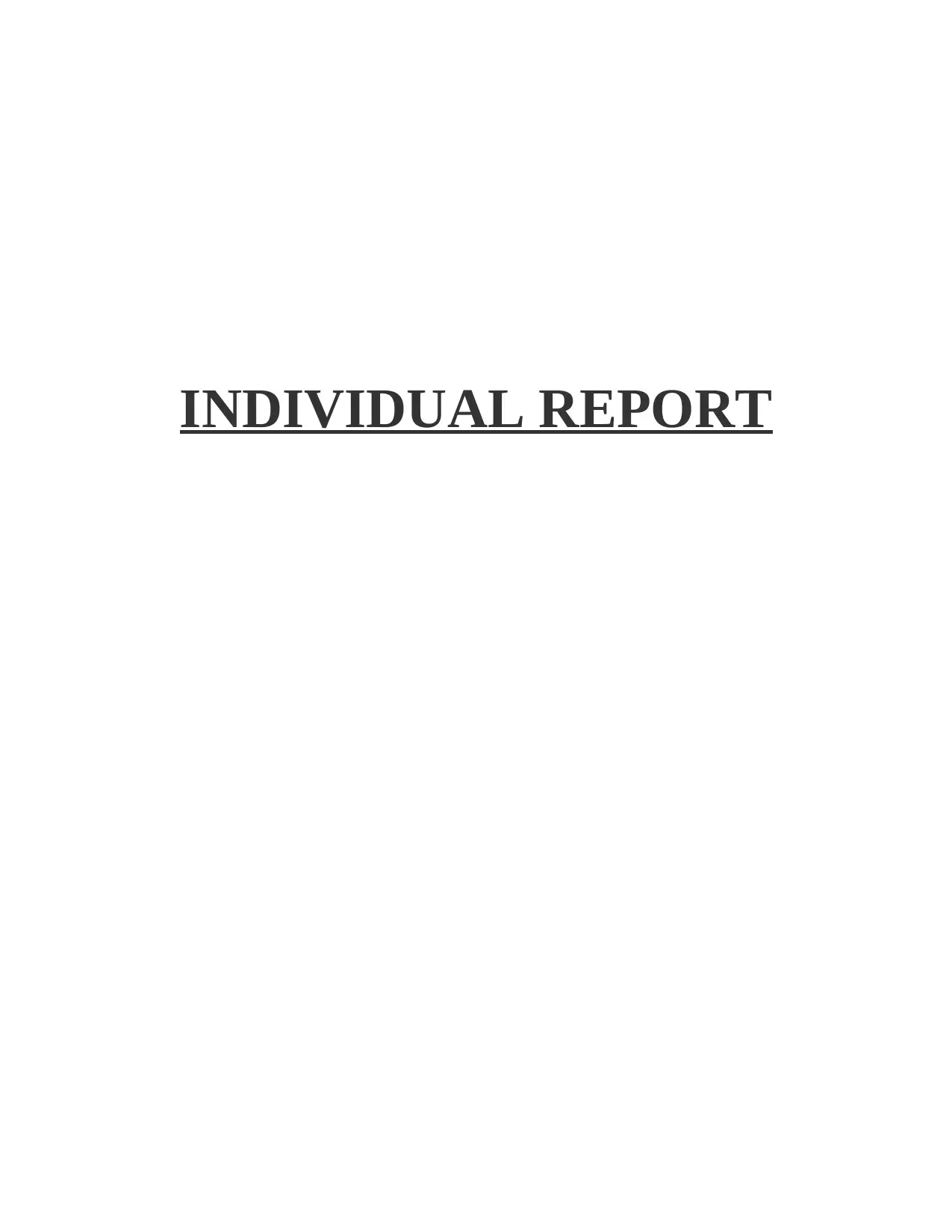
INDIVIDUAL REPORT
Paraphrase This Document
Need a fresh take? Get an instant paraphrase of this document with our AI Paraphraser
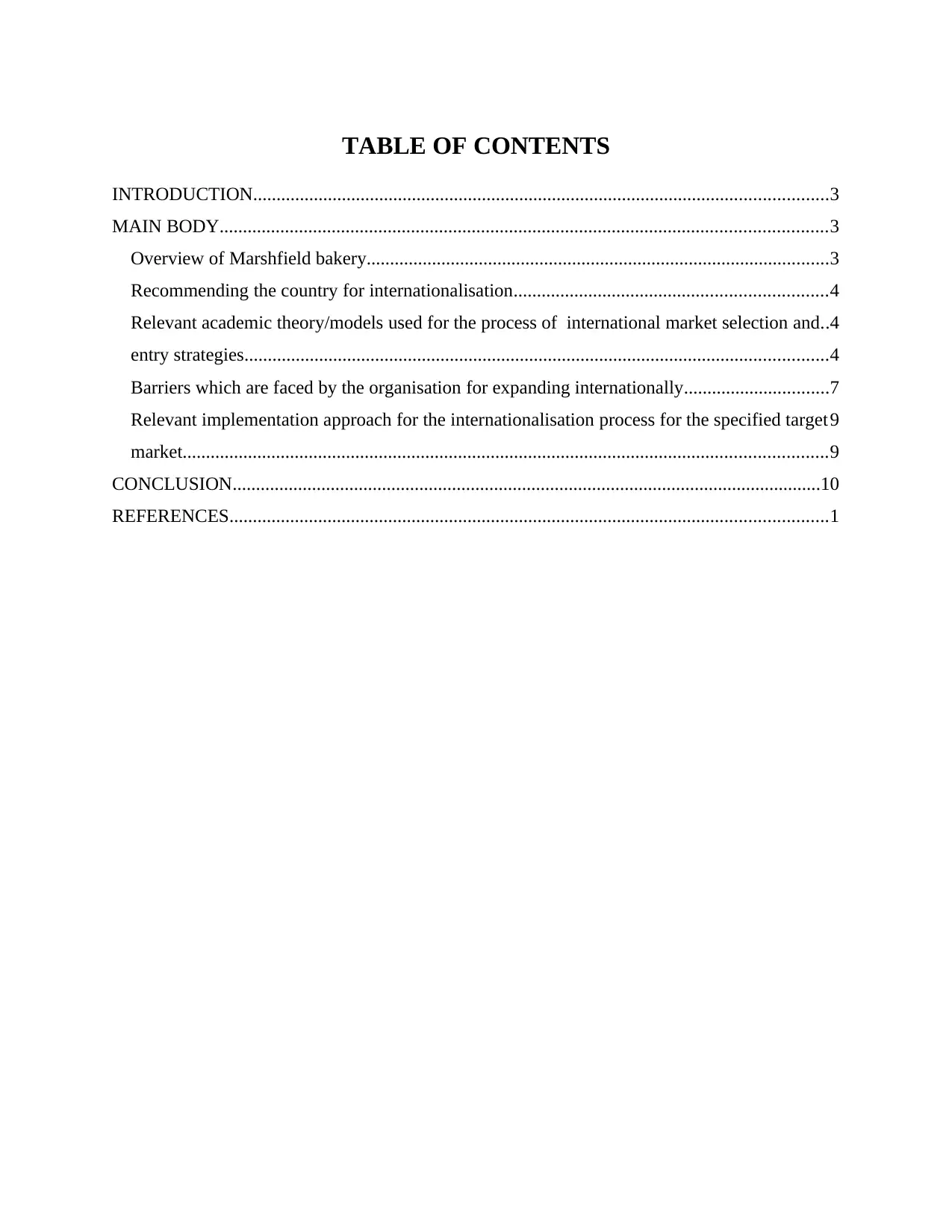
TABLE OF CONTENTS
INTRODUCTION...........................................................................................................................3
MAIN BODY..................................................................................................................................3
Overview of Marshfield bakery...................................................................................................3
Recommending the country for internationalisation...................................................................4
Relevant academic theory/models used for the process of international market selection and..4
entry strategies.............................................................................................................................4
Barriers which are faced by the organisation for expanding internationally...............................7
Relevant implementation approach for the internationalisation process for the specified target 9
market..........................................................................................................................................9
CONCLUSION..............................................................................................................................10
REFERENCES................................................................................................................................1
INTRODUCTION...........................................................................................................................3
MAIN BODY..................................................................................................................................3
Overview of Marshfield bakery...................................................................................................3
Recommending the country for internationalisation...................................................................4
Relevant academic theory/models used for the process of international market selection and..4
entry strategies.............................................................................................................................4
Barriers which are faced by the organisation for expanding internationally...............................7
Relevant implementation approach for the internationalisation process for the specified target 9
market..........................................................................................................................................9
CONCLUSION..............................................................................................................................10
REFERENCES................................................................................................................................1
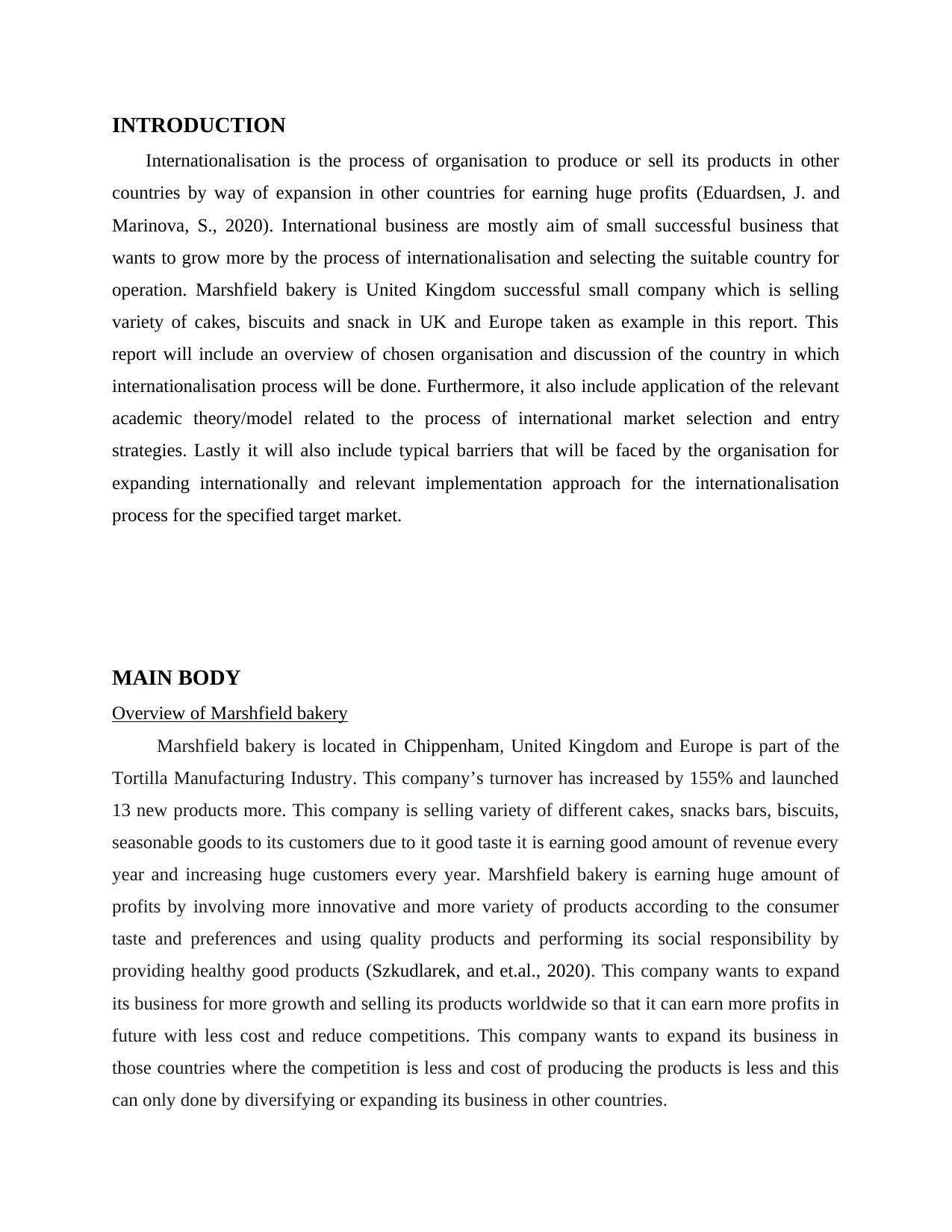
INTRODUCTION
Internationalisation is the process of organisation to produce or sell its products in other
countries by way of expansion in other countries for earning huge profits (Eduardsen, J. and
Marinova, S., 2020). International business are mostly aim of small successful business that
wants to grow more by the process of internationalisation and selecting the suitable country for
operation. Marshfield bakery is United Kingdom successful small company which is selling
variety of cakes, biscuits and snack in UK and Europe taken as example in this report. This
report will include an overview of chosen organisation and discussion of the country in which
internationalisation process will be done. Furthermore, it also include application of the relevant
academic theory/model related to the process of international market selection and entry
strategies. Lastly it will also include typical barriers that will be faced by the organisation for
expanding internationally and relevant implementation approach for the internationalisation
process for the specified target market.
MAIN BODY
Overview of Marshfield bakery
Marshfield bakery is located in Chippenham, United Kingdom and Europe is part of the
Tortilla Manufacturing Industry. This company’s turnover has increased by 155% and launched
13 new products more. This company is selling variety of different cakes, snacks bars, biscuits,
seasonable goods to its customers due to it good taste it is earning good amount of revenue every
year and increasing huge customers every year. Marshfield bakery is earning huge amount of
profits by involving more innovative and more variety of products according to the consumer
taste and preferences and using quality products and performing its social responsibility by
providing healthy good products (Szkudlarek, and et.al., 2020). This company wants to expand
its business for more growth and selling its products worldwide so that it can earn more profits in
future with less cost and reduce competitions. This company wants to expand its business in
those countries where the competition is less and cost of producing the products is less and this
can only done by diversifying or expanding its business in other countries.
Internationalisation is the process of organisation to produce or sell its products in other
countries by way of expansion in other countries for earning huge profits (Eduardsen, J. and
Marinova, S., 2020). International business are mostly aim of small successful business that
wants to grow more by the process of internationalisation and selecting the suitable country for
operation. Marshfield bakery is United Kingdom successful small company which is selling
variety of cakes, biscuits and snack in UK and Europe taken as example in this report. This
report will include an overview of chosen organisation and discussion of the country in which
internationalisation process will be done. Furthermore, it also include application of the relevant
academic theory/model related to the process of international market selection and entry
strategies. Lastly it will also include typical barriers that will be faced by the organisation for
expanding internationally and relevant implementation approach for the internationalisation
process for the specified target market.
MAIN BODY
Overview of Marshfield bakery
Marshfield bakery is located in Chippenham, United Kingdom and Europe is part of the
Tortilla Manufacturing Industry. This company’s turnover has increased by 155% and launched
13 new products more. This company is selling variety of different cakes, snacks bars, biscuits,
seasonable goods to its customers due to it good taste it is earning good amount of revenue every
year and increasing huge customers every year. Marshfield bakery is earning huge amount of
profits by involving more innovative and more variety of products according to the consumer
taste and preferences and using quality products and performing its social responsibility by
providing healthy good products (Szkudlarek, and et.al., 2020). This company wants to expand
its business for more growth and selling its products worldwide so that it can earn more profits in
future with less cost and reduce competitions. This company wants to expand its business in
those countries where the competition is less and cost of producing the products is less and this
can only done by diversifying or expanding its business in other countries.
⊘ This is a preview!⊘
Do you want full access?
Subscribe today to unlock all pages.

Trusted by 1+ million students worldwide
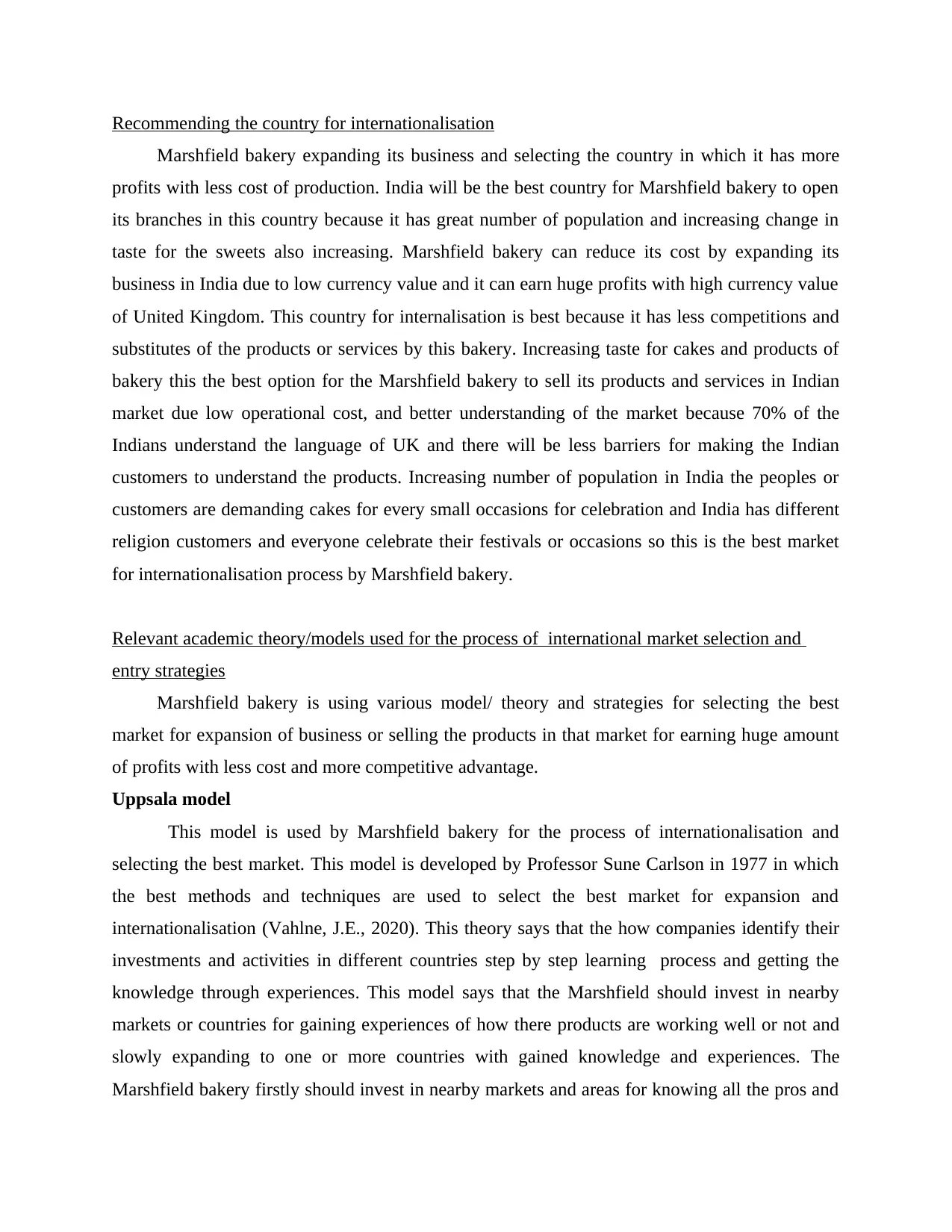
Recommending the country for internationalisation
Marshfield bakery expanding its business and selecting the country in which it has more
profits with less cost of production. India will be the best country for Marshfield bakery to open
its branches in this country because it has great number of population and increasing change in
taste for the sweets also increasing. Marshfield bakery can reduce its cost by expanding its
business in India due to low currency value and it can earn huge profits with high currency value
of United Kingdom. This country for internalisation is best because it has less competitions and
substitutes of the products or services by this bakery. Increasing taste for cakes and products of
bakery this the best option for the Marshfield bakery to sell its products and services in Indian
market due low operational cost, and better understanding of the market because 70% of the
Indians understand the language of UK and there will be less barriers for making the Indian
customers to understand the products. Increasing number of population in India the peoples or
customers are demanding cakes for every small occasions for celebration and India has different
religion customers and everyone celebrate their festivals or occasions so this is the best market
for internationalisation process by Marshfield bakery.
Relevant academic theory/models used for the process of international market selection and
entry strategies
Marshfield bakery is using various model/ theory and strategies for selecting the best
market for expansion of business or selling the products in that market for earning huge amount
of profits with less cost and more competitive advantage.
Uppsala model
This model is used by Marshfield bakery for the process of internationalisation and
selecting the best market. This model is developed by Professor Sune Carlson in 1977 in which
the best methods and techniques are used to select the best market for expansion and
internationalisation (Vahlne, J.E., 2020). This theory says that the how companies identify their
investments and activities in different countries step by step learning process and getting the
knowledge through experiences. This model says that the Marshfield should invest in nearby
markets or countries for gaining experiences of how there products are working well or not and
slowly expanding to one or more countries with gained knowledge and experiences. The
Marshfield bakery firstly should invest in nearby markets and areas for knowing all the pros and
Marshfield bakery expanding its business and selecting the country in which it has more
profits with less cost of production. India will be the best country for Marshfield bakery to open
its branches in this country because it has great number of population and increasing change in
taste for the sweets also increasing. Marshfield bakery can reduce its cost by expanding its
business in India due to low currency value and it can earn huge profits with high currency value
of United Kingdom. This country for internalisation is best because it has less competitions and
substitutes of the products or services by this bakery. Increasing taste for cakes and products of
bakery this the best option for the Marshfield bakery to sell its products and services in Indian
market due low operational cost, and better understanding of the market because 70% of the
Indians understand the language of UK and there will be less barriers for making the Indian
customers to understand the products. Increasing number of population in India the peoples or
customers are demanding cakes for every small occasions for celebration and India has different
religion customers and everyone celebrate their festivals or occasions so this is the best market
for internationalisation process by Marshfield bakery.
Relevant academic theory/models used for the process of international market selection and
entry strategies
Marshfield bakery is using various model/ theory and strategies for selecting the best
market for expansion of business or selling the products in that market for earning huge amount
of profits with less cost and more competitive advantage.
Uppsala model
This model is used by Marshfield bakery for the process of internationalisation and
selecting the best market. This model is developed by Professor Sune Carlson in 1977 in which
the best methods and techniques are used to select the best market for expansion and
internationalisation (Vahlne, J.E., 2020). This theory says that the how companies identify their
investments and activities in different countries step by step learning process and getting the
knowledge through experiences. This model says that the Marshfield should invest in nearby
markets or countries for gaining experiences of how there products are working well or not and
slowly expanding to one or more countries with gained knowledge and experiences. The
Marshfield bakery firstly should invest in nearby markets and areas for knowing all the pros and
Paraphrase This Document
Need a fresh take? Get an instant paraphrase of this document with our AI Paraphraser
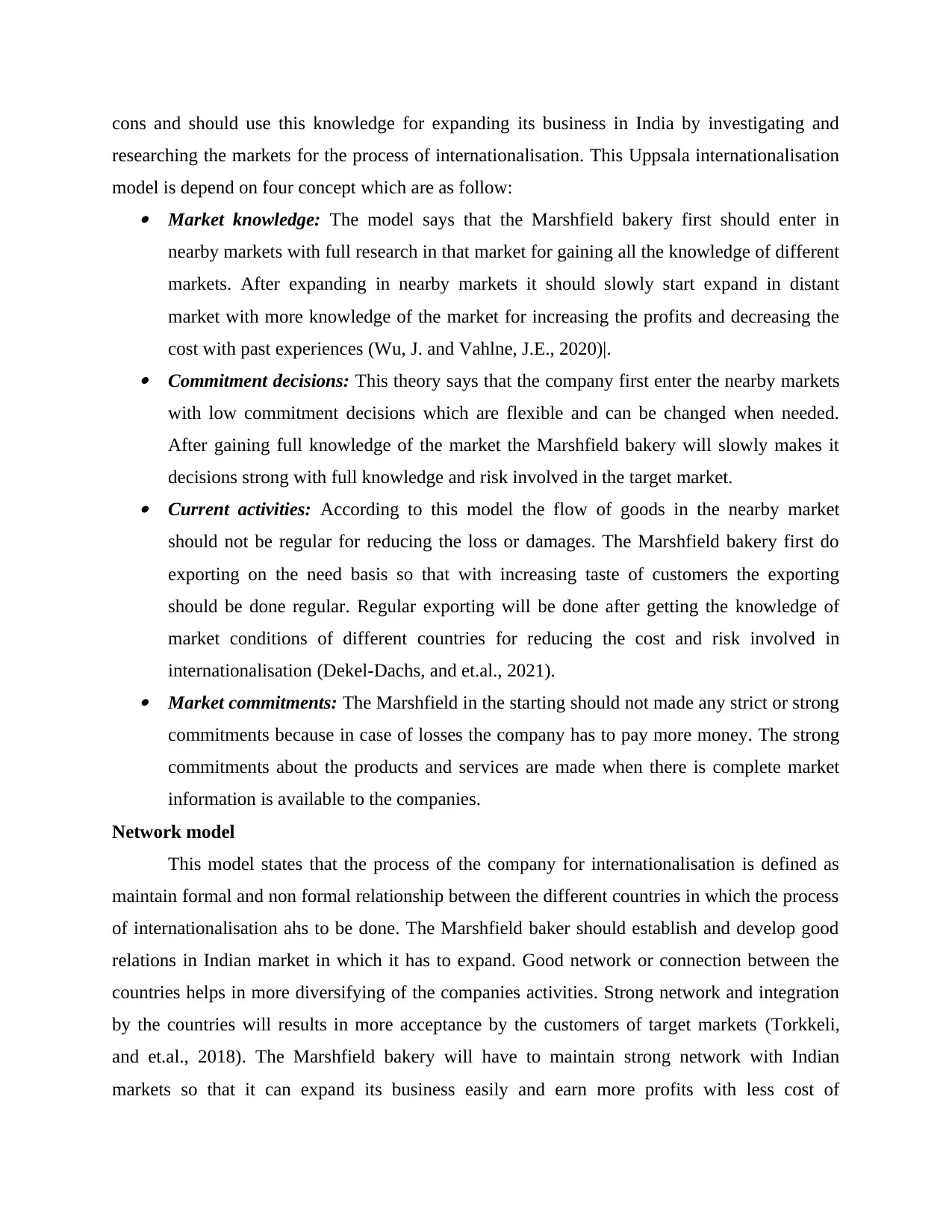
cons and should use this knowledge for expanding its business in India by investigating and
researching the markets for the process of internationalisation. This Uppsala internationalisation
model is depend on four concept which are as follow: Market knowledge: The model says that the Marshfield bakery first should enter in
nearby markets with full research in that market for gaining all the knowledge of different
markets. After expanding in nearby markets it should slowly start expand in distant
market with more knowledge of the market for increasing the profits and decreasing the
cost with past experiences (Wu, J. and Vahlne, J.E., 2020)|. Commitment decisions: This theory says that the company first enter the nearby markets
with low commitment decisions which are flexible and can be changed when needed.
After gaining full knowledge of the market the Marshfield bakery will slowly makes it
decisions strong with full knowledge and risk involved in the target market. Current activities: According to this model the flow of goods in the nearby market
should not be regular for reducing the loss or damages. The Marshfield bakery first do
exporting on the need basis so that with increasing taste of customers the exporting
should be done regular. Regular exporting will be done after getting the knowledge of
market conditions of different countries for reducing the cost and risk involved in
internationalisation (Dekel-Dachs, and et.al., 2021). Market commitments: The Marshfield in the starting should not made any strict or strong
commitments because in case of losses the company has to pay more money. The strong
commitments about the products and services are made when there is complete market
information is available to the companies.
Network model
This model states that the process of the company for internationalisation is defined as
maintain formal and non formal relationship between the different countries in which the process
of internationalisation ahs to be done. The Marshfield baker should establish and develop good
relations in Indian market in which it has to expand. Good network or connection between the
countries helps in more diversifying of the companies activities. Strong network and integration
by the countries will results in more acceptance by the customers of target markets (Torkkeli,
and et.al., 2018). The Marshfield bakery will have to maintain strong network with Indian
markets so that it can expand its business easily and earn more profits with less cost of
researching the markets for the process of internationalisation. This Uppsala internationalisation
model is depend on four concept which are as follow: Market knowledge: The model says that the Marshfield bakery first should enter in
nearby markets with full research in that market for gaining all the knowledge of different
markets. After expanding in nearby markets it should slowly start expand in distant
market with more knowledge of the market for increasing the profits and decreasing the
cost with past experiences (Wu, J. and Vahlne, J.E., 2020)|. Commitment decisions: This theory says that the company first enter the nearby markets
with low commitment decisions which are flexible and can be changed when needed.
After gaining full knowledge of the market the Marshfield bakery will slowly makes it
decisions strong with full knowledge and risk involved in the target market. Current activities: According to this model the flow of goods in the nearby market
should not be regular for reducing the loss or damages. The Marshfield bakery first do
exporting on the need basis so that with increasing taste of customers the exporting
should be done regular. Regular exporting will be done after getting the knowledge of
market conditions of different countries for reducing the cost and risk involved in
internationalisation (Dekel-Dachs, and et.al., 2021). Market commitments: The Marshfield in the starting should not made any strict or strong
commitments because in case of losses the company has to pay more money. The strong
commitments about the products and services are made when there is complete market
information is available to the companies.
Network model
This model states that the process of the company for internationalisation is defined as
maintain formal and non formal relationship between the different countries in which the process
of internationalisation ahs to be done. The Marshfield baker should establish and develop good
relations in Indian market in which it has to expand. Good network or connection between the
countries helps in more diversifying of the companies activities. Strong network and integration
by the countries will results in more acceptance by the customers of target markets (Torkkeli,
and et.al., 2018). The Marshfield bakery will have to maintain strong network with Indian
markets so that it can expand its business easily and earn more profits with less cost of
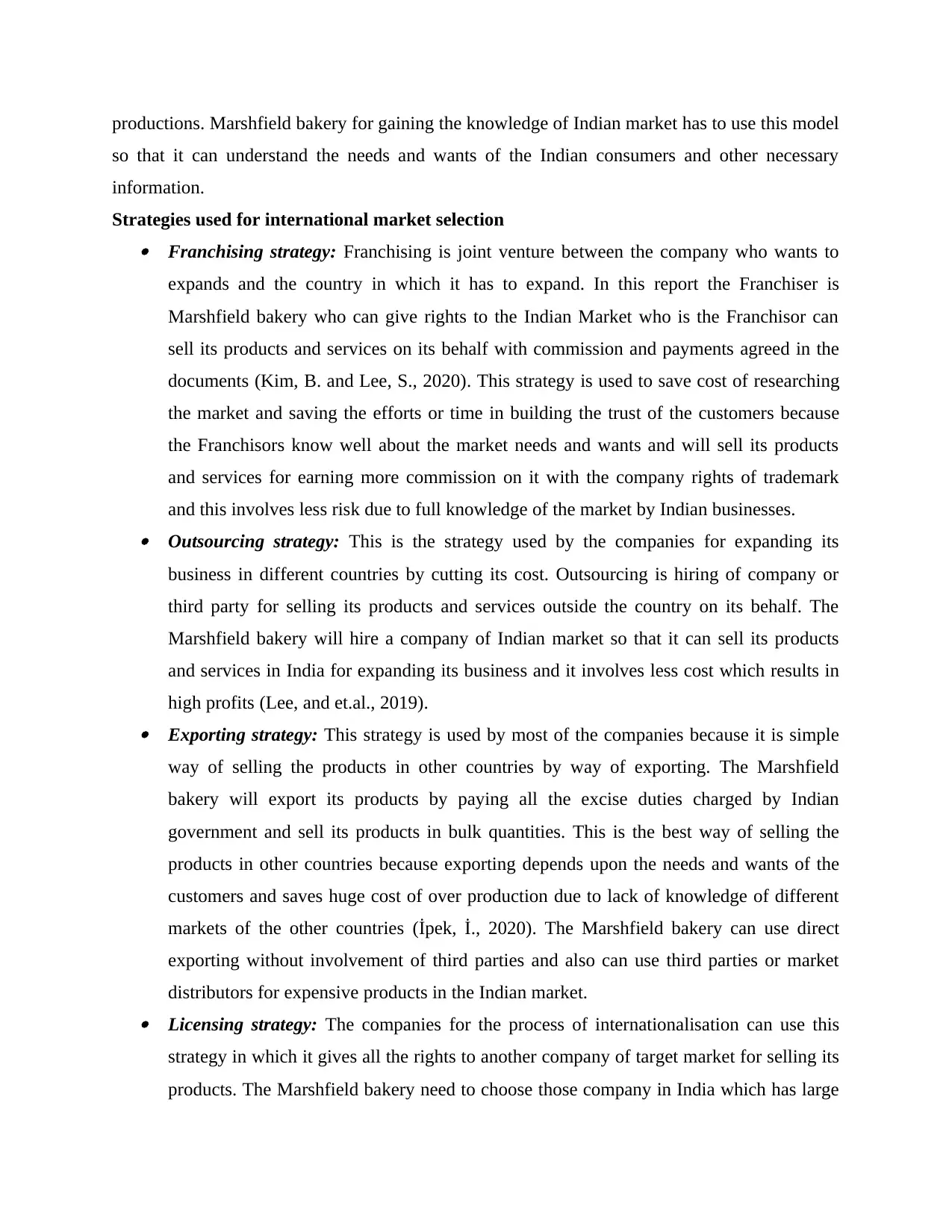
productions. Marshfield bakery for gaining the knowledge of Indian market has to use this model
so that it can understand the needs and wants of the Indian consumers and other necessary
information.
Strategies used for international market selection Franchising strategy: Franchising is joint venture between the company who wants to
expands and the country in which it has to expand. In this report the Franchiser is
Marshfield bakery who can give rights to the Indian Market who is the Franchisor can
sell its products and services on its behalf with commission and payments agreed in the
documents (Kim, B. and Lee, S., 2020). This strategy is used to save cost of researching
the market and saving the efforts or time in building the trust of the customers because
the Franchisors know well about the market needs and wants and will sell its products
and services for earning more commission on it with the company rights of trademark
and this involves less risk due to full knowledge of the market by Indian businesses. Outsourcing strategy: This is the strategy used by the companies for expanding its
business in different countries by cutting its cost. Outsourcing is hiring of company or
third party for selling its products and services outside the country on its behalf. The
Marshfield bakery will hire a company of Indian market so that it can sell its products
and services in India for expanding its business and it involves less cost which results in
high profits (Lee, and et.al., 2019). Exporting strategy: This strategy is used by most of the companies because it is simple
way of selling the products in other countries by way of exporting. The Marshfield
bakery will export its products by paying all the excise duties charged by Indian
government and sell its products in bulk quantities. This is the best way of selling the
products in other countries because exporting depends upon the needs and wants of the
customers and saves huge cost of over production due to lack of knowledge of different
markets of the other countries (İpek, İ., 2020). The Marshfield bakery can use direct
exporting without involvement of third parties and also can use third parties or market
distributors for expensive products in the Indian market. Licensing strategy: The companies for the process of internationalisation can use this
strategy in which it gives all the rights to another company of target market for selling its
products. The Marshfield bakery need to choose those company in India which has large
so that it can understand the needs and wants of the Indian consumers and other necessary
information.
Strategies used for international market selection Franchising strategy: Franchising is joint venture between the company who wants to
expands and the country in which it has to expand. In this report the Franchiser is
Marshfield bakery who can give rights to the Indian Market who is the Franchisor can
sell its products and services on its behalf with commission and payments agreed in the
documents (Kim, B. and Lee, S., 2020). This strategy is used to save cost of researching
the market and saving the efforts or time in building the trust of the customers because
the Franchisors know well about the market needs and wants and will sell its products
and services for earning more commission on it with the company rights of trademark
and this involves less risk due to full knowledge of the market by Indian businesses. Outsourcing strategy: This is the strategy used by the companies for expanding its
business in different countries by cutting its cost. Outsourcing is hiring of company or
third party for selling its products and services outside the country on its behalf. The
Marshfield bakery will hire a company of Indian market so that it can sell its products
and services in India for expanding its business and it involves less cost which results in
high profits (Lee, and et.al., 2019). Exporting strategy: This strategy is used by most of the companies because it is simple
way of selling the products in other countries by way of exporting. The Marshfield
bakery will export its products by paying all the excise duties charged by Indian
government and sell its products in bulk quantities. This is the best way of selling the
products in other countries because exporting depends upon the needs and wants of the
customers and saves huge cost of over production due to lack of knowledge of different
markets of the other countries (İpek, İ., 2020). The Marshfield bakery can use direct
exporting without involvement of third parties and also can use third parties or market
distributors for expensive products in the Indian market. Licensing strategy: The companies for the process of internationalisation can use this
strategy in which it gives all the rights to another company of target market for selling its
products. The Marshfield bakery need to choose those company in India which has large
⊘ This is a preview!⊘
Do you want full access?
Subscribe today to unlock all pages.

Trusted by 1+ million students worldwide
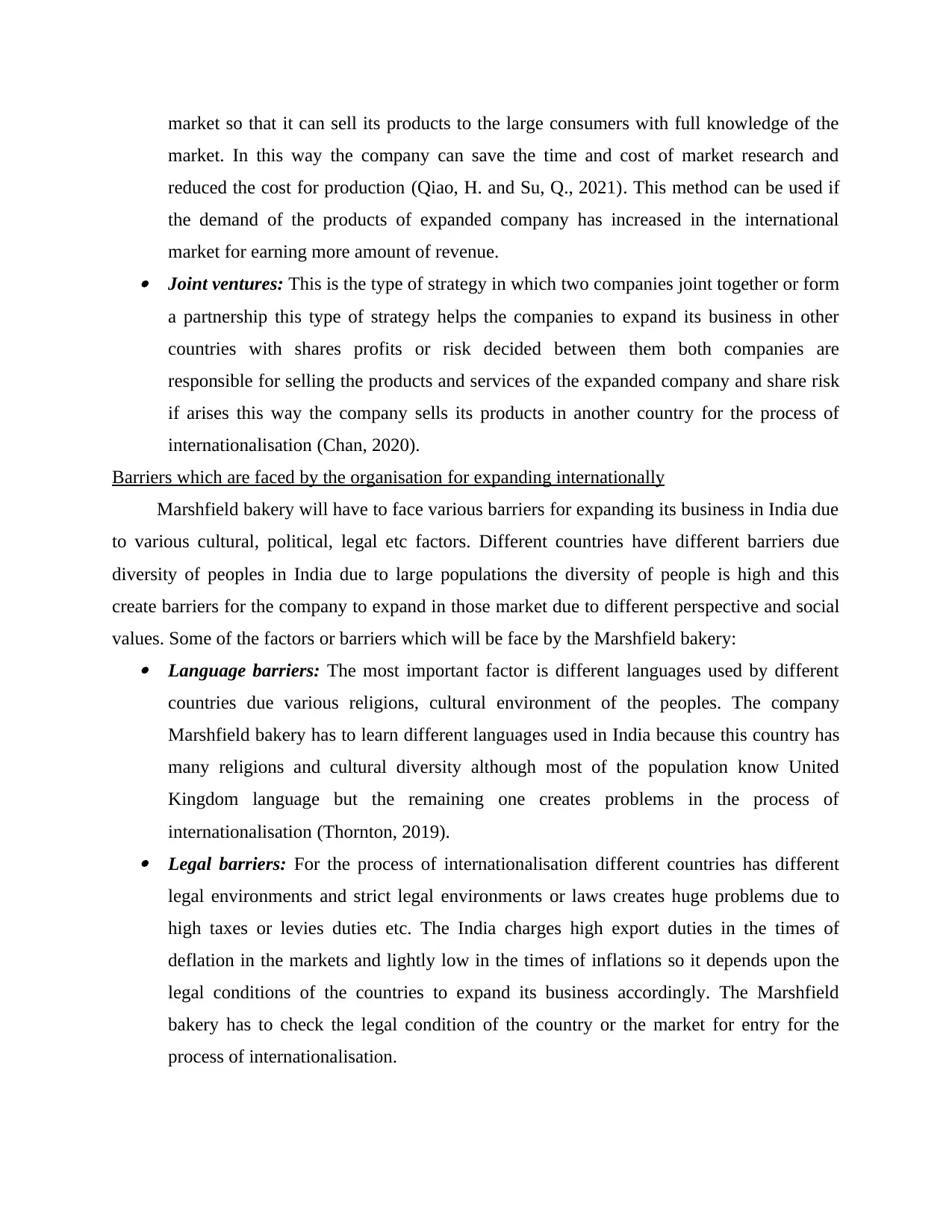
market so that it can sell its products to the large consumers with full knowledge of the
market. In this way the company can save the time and cost of market research and
reduced the cost for production (Qiao, H. and Su, Q., 2021). This method can be used if
the demand of the products of expanded company has increased in the international
market for earning more amount of revenue. Joint ventures: This is the type of strategy in which two companies joint together or form
a partnership this type of strategy helps the companies to expand its business in other
countries with shares profits or risk decided between them both companies are
responsible for selling the products and services of the expanded company and share risk
if arises this way the company sells its products in another country for the process of
internationalisation (Chan, 2020).
Barriers which are faced by the organisation for expanding internationally
Marshfield bakery will have to face various barriers for expanding its business in India due
to various cultural, political, legal etc factors. Different countries have different barriers due
diversity of peoples in India due to large populations the diversity of people is high and this
create barriers for the company to expand in those market due to different perspective and social
values. Some of the factors or barriers which will be face by the Marshfield bakery: Language barriers: The most important factor is different languages used by different
countries due various religions, cultural environment of the peoples. The company
Marshfield bakery has to learn different languages used in India because this country has
many religions and cultural diversity although most of the population know United
Kingdom language but the remaining one creates problems in the process of
internationalisation (Thornton, 2019). Legal barriers: For the process of internationalisation different countries has different
legal environments and strict legal environments or laws creates huge problems due to
high taxes or levies duties etc. The India charges high export duties in the times of
deflation in the markets and lightly low in the times of inflations so it depends upon the
legal conditions of the countries to expand its business accordingly. The Marshfield
bakery has to check the legal condition of the country or the market for entry for the
process of internationalisation.
market. In this way the company can save the time and cost of market research and
reduced the cost for production (Qiao, H. and Su, Q., 2021). This method can be used if
the demand of the products of expanded company has increased in the international
market for earning more amount of revenue. Joint ventures: This is the type of strategy in which two companies joint together or form
a partnership this type of strategy helps the companies to expand its business in other
countries with shares profits or risk decided between them both companies are
responsible for selling the products and services of the expanded company and share risk
if arises this way the company sells its products in another country for the process of
internationalisation (Chan, 2020).
Barriers which are faced by the organisation for expanding internationally
Marshfield bakery will have to face various barriers for expanding its business in India due
to various cultural, political, legal etc factors. Different countries have different barriers due
diversity of peoples in India due to large populations the diversity of people is high and this
create barriers for the company to expand in those market due to different perspective and social
values. Some of the factors or barriers which will be face by the Marshfield bakery: Language barriers: The most important factor is different languages used by different
countries due various religions, cultural environment of the peoples. The company
Marshfield bakery has to learn different languages used in India because this country has
many religions and cultural diversity although most of the population know United
Kingdom language but the remaining one creates problems in the process of
internationalisation (Thornton, 2019). Legal barriers: For the process of internationalisation different countries has different
legal environments and strict legal environments or laws creates huge problems due to
high taxes or levies duties etc. The India charges high export duties in the times of
deflation in the markets and lightly low in the times of inflations so it depends upon the
legal conditions of the countries to expand its business accordingly. The Marshfield
bakery has to check the legal condition of the country or the market for entry for the
process of internationalisation.
Paraphrase This Document
Need a fresh take? Get an instant paraphrase of this document with our AI Paraphraser
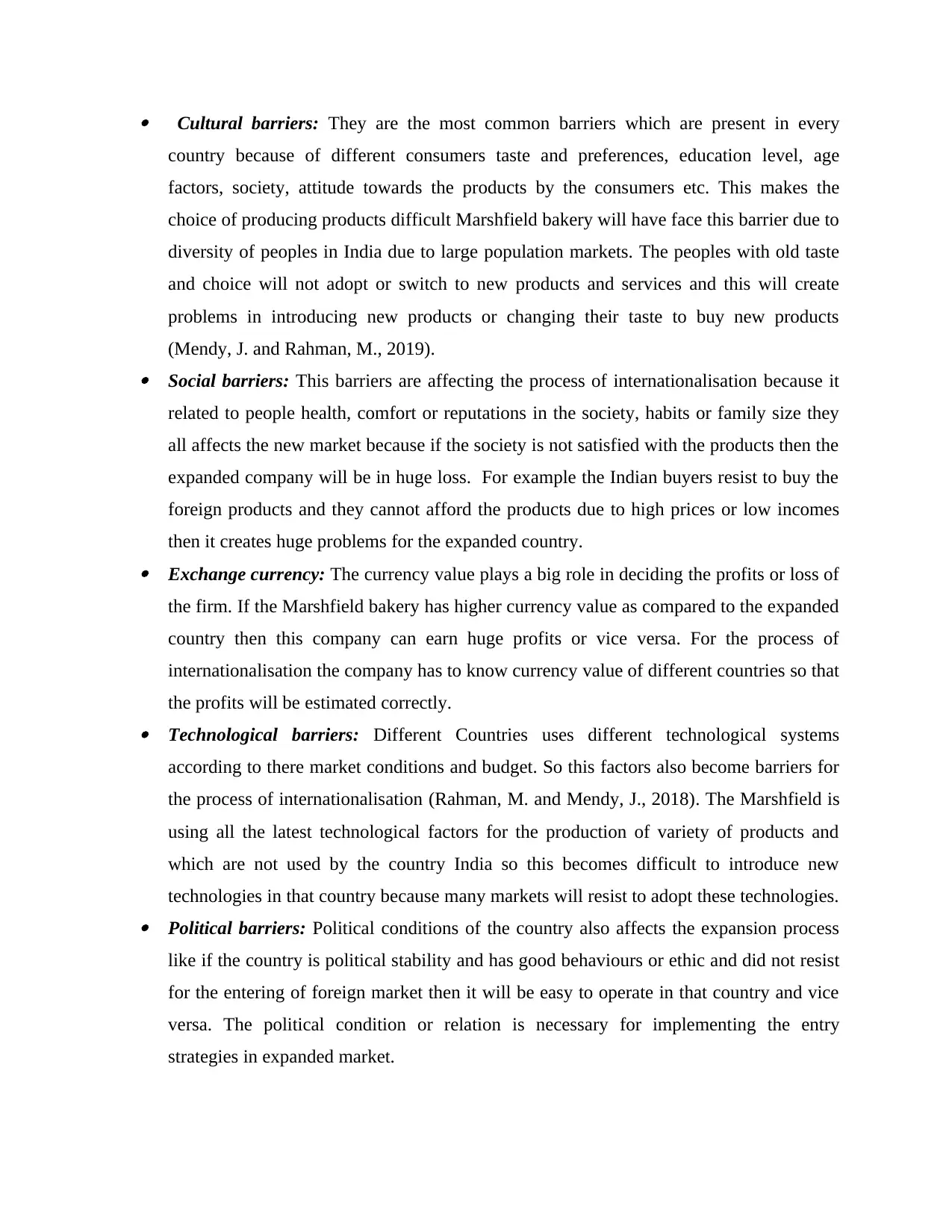
Cultural barriers: They are the most common barriers which are present in every
country because of different consumers taste and preferences, education level, age
factors, society, attitude towards the products by the consumers etc. This makes the
choice of producing products difficult Marshfield bakery will have face this barrier due to
diversity of peoples in India due to large population markets. The peoples with old taste
and choice will not adopt or switch to new products and services and this will create
problems in introducing new products or changing their taste to buy new products
(Mendy, J. and Rahman, M., 2019). Social barriers: This barriers are affecting the process of internationalisation because it
related to people health, comfort or reputations in the society, habits or family size they
all affects the new market because if the society is not satisfied with the products then the
expanded company will be in huge loss. For example the Indian buyers resist to buy the
foreign products and they cannot afford the products due to high prices or low incomes
then it creates huge problems for the expanded country. Exchange currency: The currency value plays a big role in deciding the profits or loss of
the firm. If the Marshfield bakery has higher currency value as compared to the expanded
country then this company can earn huge profits or vice versa. For the process of
internationalisation the company has to know currency value of different countries so that
the profits will be estimated correctly. Technological barriers: Different Countries uses different technological systems
according to there market conditions and budget. So this factors also become barriers for
the process of internationalisation (Rahman, M. and Mendy, J., 2018). The Marshfield is
using all the latest technological factors for the production of variety of products and
which are not used by the country India so this becomes difficult to introduce new
technologies in that country because many markets will resist to adopt these technologies. Political barriers: Political conditions of the country also affects the expansion process
like if the country is political stability and has good behaviours or ethic and did not resist
for the entering of foreign market then it will be easy to operate in that country and vice
versa. The political condition or relation is necessary for implementing the entry
strategies in expanded market.
country because of different consumers taste and preferences, education level, age
factors, society, attitude towards the products by the consumers etc. This makes the
choice of producing products difficult Marshfield bakery will have face this barrier due to
diversity of peoples in India due to large population markets. The peoples with old taste
and choice will not adopt or switch to new products and services and this will create
problems in introducing new products or changing their taste to buy new products
(Mendy, J. and Rahman, M., 2019). Social barriers: This barriers are affecting the process of internationalisation because it
related to people health, comfort or reputations in the society, habits or family size they
all affects the new market because if the society is not satisfied with the products then the
expanded company will be in huge loss. For example the Indian buyers resist to buy the
foreign products and they cannot afford the products due to high prices or low incomes
then it creates huge problems for the expanded country. Exchange currency: The currency value plays a big role in deciding the profits or loss of
the firm. If the Marshfield bakery has higher currency value as compared to the expanded
country then this company can earn huge profits or vice versa. For the process of
internationalisation the company has to know currency value of different countries so that
the profits will be estimated correctly. Technological barriers: Different Countries uses different technological systems
according to there market conditions and budget. So this factors also become barriers for
the process of internationalisation (Rahman, M. and Mendy, J., 2018). The Marshfield is
using all the latest technological factors for the production of variety of products and
which are not used by the country India so this becomes difficult to introduce new
technologies in that country because many markets will resist to adopt these technologies. Political barriers: Political conditions of the country also affects the expansion process
like if the country is political stability and has good behaviours or ethic and did not resist
for the entering of foreign market then it will be easy to operate in that country and vice
versa. The political condition or relation is necessary for implementing the entry
strategies in expanded market.
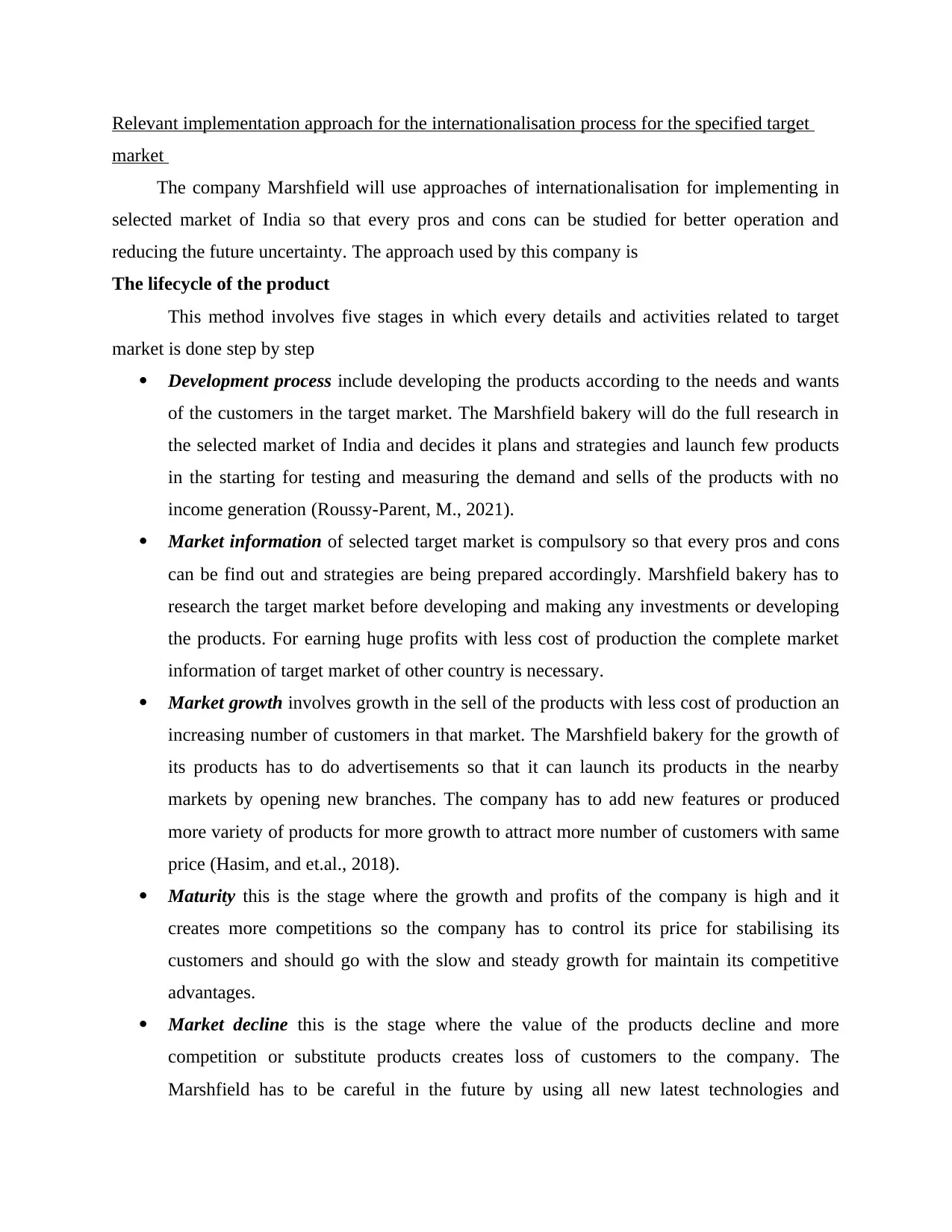
Relevant implementation approach for the internationalisation process for the specified target
market
The company Marshfield will use approaches of internationalisation for implementing in
selected market of India so that every pros and cons can be studied for better operation and
reducing the future uncertainty. The approach used by this company is
The lifecycle of the product
This method involves five stages in which every details and activities related to target
market is done step by step
Development process include developing the products according to the needs and wants
of the customers in the target market. The Marshfield bakery will do the full research in
the selected market of India and decides it plans and strategies and launch few products
in the starting for testing and measuring the demand and sells of the products with no
income generation (Roussy-Parent, M., 2021).
Market information of selected target market is compulsory so that every pros and cons
can be find out and strategies are being prepared accordingly. Marshfield bakery has to
research the target market before developing and making any investments or developing
the products. For earning huge profits with less cost of production the complete market
information of target market of other country is necessary.
Market growth involves growth in the sell of the products with less cost of production an
increasing number of customers in that market. The Marshfield bakery for the growth of
its products has to do advertisements so that it can launch its products in the nearby
markets by opening new branches. The company has to add new features or produced
more variety of products for more growth to attract more number of customers with same
price (Hasim, and et.al., 2018).
Maturity this is the stage where the growth and profits of the company is high and it
creates more competitions so the company has to control its price for stabilising its
customers and should go with the slow and steady growth for maintain its competitive
advantages.
Market decline this is the stage where the value of the products decline and more
competition or substitute products creates loss of customers to the company. The
Marshfield has to be careful in the future by using all new latest technologies and
market
The company Marshfield will use approaches of internationalisation for implementing in
selected market of India so that every pros and cons can be studied for better operation and
reducing the future uncertainty. The approach used by this company is
The lifecycle of the product
This method involves five stages in which every details and activities related to target
market is done step by step
Development process include developing the products according to the needs and wants
of the customers in the target market. The Marshfield bakery will do the full research in
the selected market of India and decides it plans and strategies and launch few products
in the starting for testing and measuring the demand and sells of the products with no
income generation (Roussy-Parent, M., 2021).
Market information of selected target market is compulsory so that every pros and cons
can be find out and strategies are being prepared accordingly. Marshfield bakery has to
research the target market before developing and making any investments or developing
the products. For earning huge profits with less cost of production the complete market
information of target market of other country is necessary.
Market growth involves growth in the sell of the products with less cost of production an
increasing number of customers in that market. The Marshfield bakery for the growth of
its products has to do advertisements so that it can launch its products in the nearby
markets by opening new branches. The company has to add new features or produced
more variety of products for more growth to attract more number of customers with same
price (Hasim, and et.al., 2018).
Maturity this is the stage where the growth and profits of the company is high and it
creates more competitions so the company has to control its price for stabilising its
customers and should go with the slow and steady growth for maintain its competitive
advantages.
Market decline this is the stage where the value of the products decline and more
competition or substitute products creates loss of customers to the company. The
Marshfield has to be careful in the future by using all new latest technologies and
⊘ This is a preview!⊘
Do you want full access?
Subscribe today to unlock all pages.

Trusted by 1+ million students worldwide
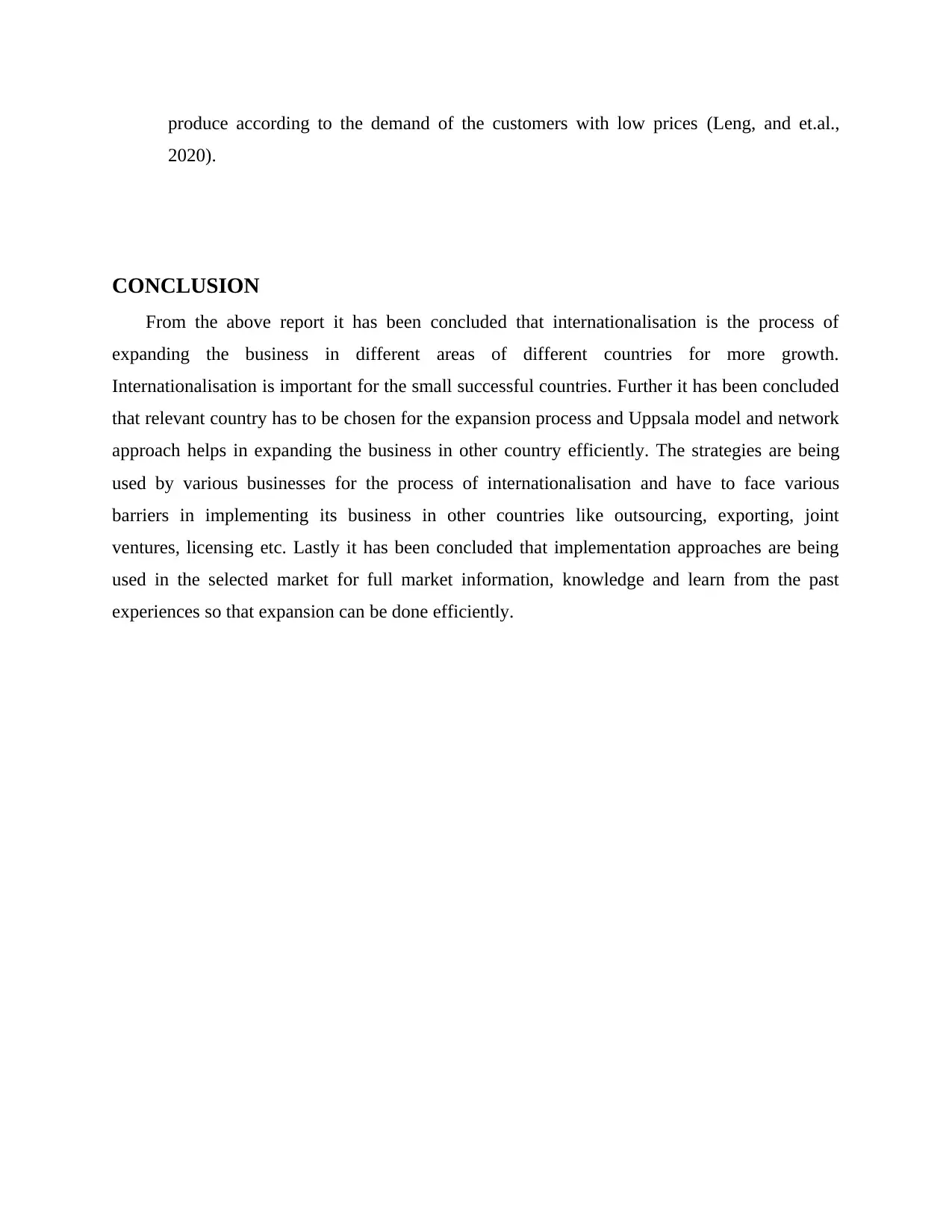
produce according to the demand of the customers with low prices (Leng, and et.al.,
2020).
CONCLUSION
From the above report it has been concluded that internationalisation is the process of
expanding the business in different areas of different countries for more growth.
Internationalisation is important for the small successful countries. Further it has been concluded
that relevant country has to be chosen for the expansion process and Uppsala model and network
approach helps in expanding the business in other country efficiently. The strategies are being
used by various businesses for the process of internationalisation and have to face various
barriers in implementing its business in other countries like outsourcing, exporting, joint
ventures, licensing etc. Lastly it has been concluded that implementation approaches are being
used in the selected market for full market information, knowledge and learn from the past
experiences so that expansion can be done efficiently.
2020).
CONCLUSION
From the above report it has been concluded that internationalisation is the process of
expanding the business in different areas of different countries for more growth.
Internationalisation is important for the small successful countries. Further it has been concluded
that relevant country has to be chosen for the expansion process and Uppsala model and network
approach helps in expanding the business in other country efficiently. The strategies are being
used by various businesses for the process of internationalisation and have to face various
barriers in implementing its business in other countries like outsourcing, exporting, joint
ventures, licensing etc. Lastly it has been concluded that implementation approaches are being
used in the selected market for full market information, knowledge and learn from the past
experiences so that expansion can be done efficiently.
Paraphrase This Document
Need a fresh take? Get an instant paraphrase of this document with our AI Paraphraser
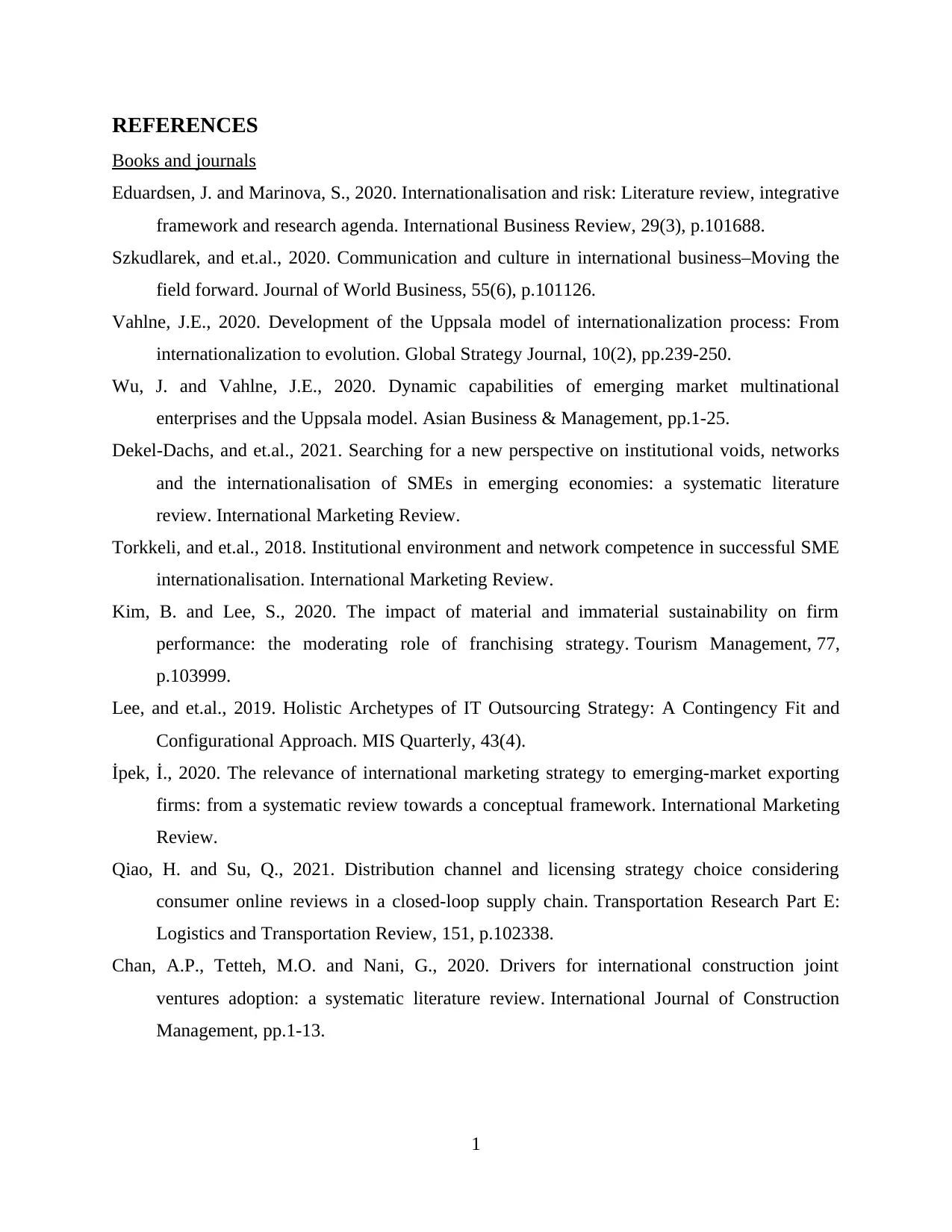
REFERENCES
Books and journals
Eduardsen, J. and Marinova, S., 2020. Internationalisation and risk: Literature review, integrative
framework and research agenda. International Business Review, 29(3), p.101688.
Szkudlarek, and et.al., 2020. Communication and culture in international business–Moving the
field forward. Journal of World Business, 55(6), p.101126.
Vahlne, J.E., 2020. Development of the Uppsala model of internationalization process: From
internationalization to evolution. Global Strategy Journal, 10(2), pp.239-250.
Wu, J. and Vahlne, J.E., 2020. Dynamic capabilities of emerging market multinational
enterprises and the Uppsala model. Asian Business & Management, pp.1-25.
Dekel-Dachs, and et.al., 2021. Searching for a new perspective on institutional voids, networks
and the internationalisation of SMEs in emerging economies: a systematic literature
review. International Marketing Review.
Torkkeli, and et.al., 2018. Institutional environment and network competence in successful SME
internationalisation. International Marketing Review.
Kim, B. and Lee, S., 2020. The impact of material and immaterial sustainability on firm
performance: the moderating role of franchising strategy. Tourism Management, 77,
p.103999.
Lee, and et.al., 2019. Holistic Archetypes of IT Outsourcing Strategy: A Contingency Fit and
Configurational Approach. MIS Quarterly, 43(4).
İpek, İ., 2020. The relevance of international marketing strategy to emerging-market exporting
firms: from a systematic review towards a conceptual framework. International Marketing
Review.
Qiao, H. and Su, Q., 2021. Distribution channel and licensing strategy choice considering
consumer online reviews in a closed-loop supply chain. Transportation Research Part E:
Logistics and Transportation Review, 151, p.102338.
Chan, A.P., Tetteh, M.O. and Nani, G., 2020. Drivers for international construction joint
ventures adoption: a systematic literature review. International Journal of Construction
Management, pp.1-13.
1
Books and journals
Eduardsen, J. and Marinova, S., 2020. Internationalisation and risk: Literature review, integrative
framework and research agenda. International Business Review, 29(3), p.101688.
Szkudlarek, and et.al., 2020. Communication and culture in international business–Moving the
field forward. Journal of World Business, 55(6), p.101126.
Vahlne, J.E., 2020. Development of the Uppsala model of internationalization process: From
internationalization to evolution. Global Strategy Journal, 10(2), pp.239-250.
Wu, J. and Vahlne, J.E., 2020. Dynamic capabilities of emerging market multinational
enterprises and the Uppsala model. Asian Business & Management, pp.1-25.
Dekel-Dachs, and et.al., 2021. Searching for a new perspective on institutional voids, networks
and the internationalisation of SMEs in emerging economies: a systematic literature
review. International Marketing Review.
Torkkeli, and et.al., 2018. Institutional environment and network competence in successful SME
internationalisation. International Marketing Review.
Kim, B. and Lee, S., 2020. The impact of material and immaterial sustainability on firm
performance: the moderating role of franchising strategy. Tourism Management, 77,
p.103999.
Lee, and et.al., 2019. Holistic Archetypes of IT Outsourcing Strategy: A Contingency Fit and
Configurational Approach. MIS Quarterly, 43(4).
İpek, İ., 2020. The relevance of international marketing strategy to emerging-market exporting
firms: from a systematic review towards a conceptual framework. International Marketing
Review.
Qiao, H. and Su, Q., 2021. Distribution channel and licensing strategy choice considering
consumer online reviews in a closed-loop supply chain. Transportation Research Part E:
Logistics and Transportation Review, 151, p.102338.
Chan, A.P., Tetteh, M.O. and Nani, G., 2020. Drivers for international construction joint
ventures adoption: a systematic literature review. International Journal of Construction
Management, pp.1-13.
1
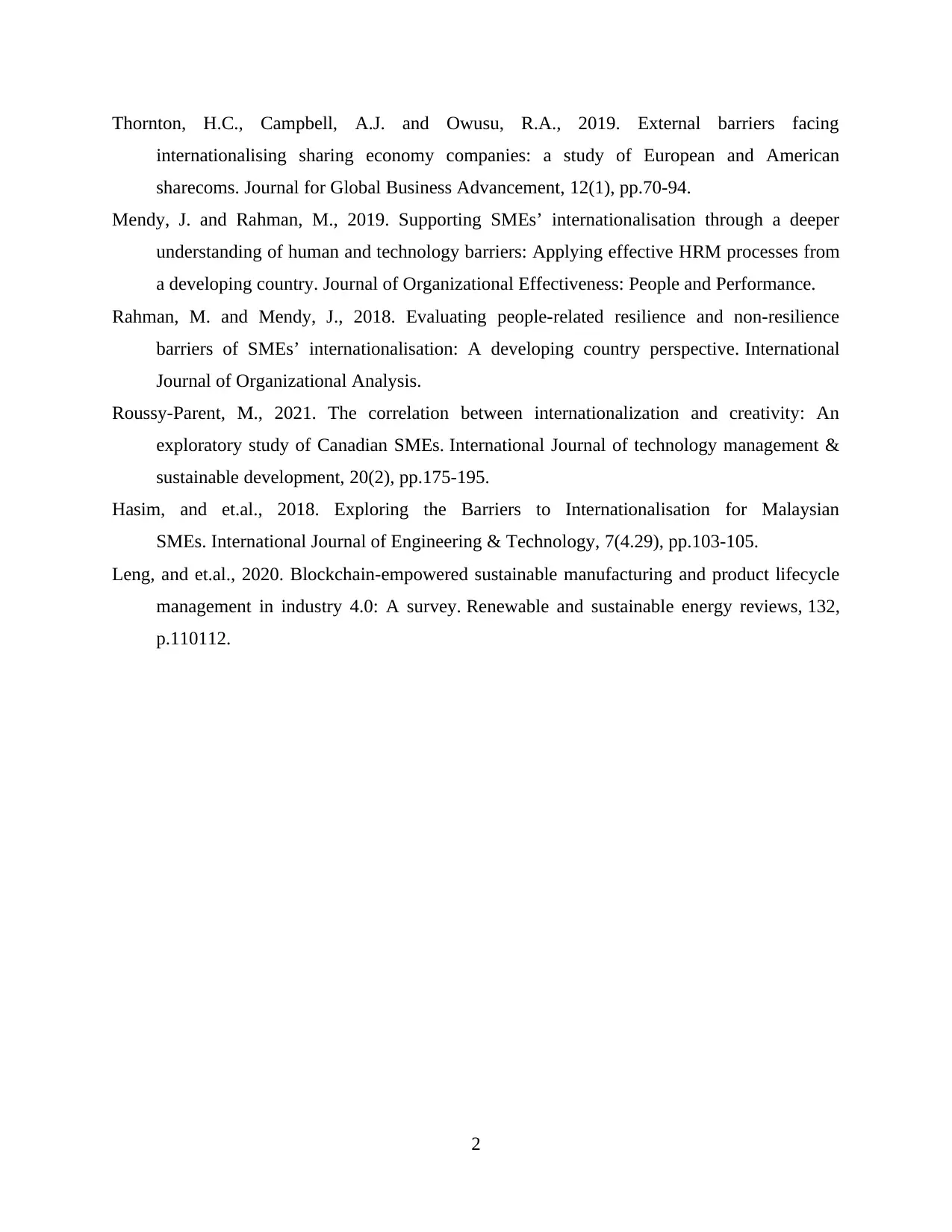
Thornton, H.C., Campbell, A.J. and Owusu, R.A., 2019. External barriers facing
internationalising sharing economy companies: a study of European and American
sharecoms. Journal for Global Business Advancement, 12(1), pp.70-94.
Mendy, J. and Rahman, M., 2019. Supporting SMEs’ internationalisation through a deeper
understanding of human and technology barriers: Applying effective HRM processes from
a developing country. Journal of Organizational Effectiveness: People and Performance.
Rahman, M. and Mendy, J., 2018. Evaluating people-related resilience and non-resilience
barriers of SMEs’ internationalisation: A developing country perspective. International
Journal of Organizational Analysis.
Roussy-Parent, M., 2021. The correlation between internationalization and creativity: An
exploratory study of Canadian SMEs. International Journal of technology management &
sustainable development, 20(2), pp.175-195.
Hasim, and et.al., 2018. Exploring the Barriers to Internationalisation for Malaysian
SMEs. International Journal of Engineering & Technology, 7(4.29), pp.103-105.
Leng, and et.al., 2020. Blockchain-empowered sustainable manufacturing and product lifecycle
management in industry 4.0: A survey. Renewable and sustainable energy reviews, 132,
p.110112.
2
internationalising sharing economy companies: a study of European and American
sharecoms. Journal for Global Business Advancement, 12(1), pp.70-94.
Mendy, J. and Rahman, M., 2019. Supporting SMEs’ internationalisation through a deeper
understanding of human and technology barriers: Applying effective HRM processes from
a developing country. Journal of Organizational Effectiveness: People and Performance.
Rahman, M. and Mendy, J., 2018. Evaluating people-related resilience and non-resilience
barriers of SMEs’ internationalisation: A developing country perspective. International
Journal of Organizational Analysis.
Roussy-Parent, M., 2021. The correlation between internationalization and creativity: An
exploratory study of Canadian SMEs. International Journal of technology management &
sustainable development, 20(2), pp.175-195.
Hasim, and et.al., 2018. Exploring the Barriers to Internationalisation for Malaysian
SMEs. International Journal of Engineering & Technology, 7(4.29), pp.103-105.
Leng, and et.al., 2020. Blockchain-empowered sustainable manufacturing and product lifecycle
management in industry 4.0: A survey. Renewable and sustainable energy reviews, 132,
p.110112.
2
⊘ This is a preview!⊘
Do you want full access?
Subscribe today to unlock all pages.

Trusted by 1+ million students worldwide
1 out of 13
Related Documents
Your All-in-One AI-Powered Toolkit for Academic Success.
+13062052269
info@desklib.com
Available 24*7 on WhatsApp / Email
![[object Object]](/_next/static/media/star-bottom.7253800d.svg)
Unlock your academic potential
Copyright © 2020–2026 A2Z Services. All Rights Reserved. Developed and managed by ZUCOL.




